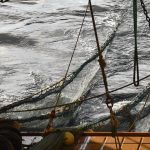A new study revealed that fish oil replacements may help reduce the aquaculture industry’s dependence on wild fisheries for their essential omega-3 requirements. It is also said that it may help overcome existing barriers that impede the industry’s expansion. The study is a result of research activities conducted to evaluate alternative lipid sources. It focuses on the effects of fish oil replacement in finfish nutrition on feed quality, fish performance, feed efficiency, lipid metabolism, final eating quality and related economic aspects.
Dr. Giovanni Turchini from the School of Life and Environmental Science, Deakin University, Australia, informed that there is heavy emphasis for aquaculture to meet the global shortage of fish and seafood created by unsustainable fishing practices. He aso said that dietary fish oil is required for the production of omega-3-rich farmed fish and this commodity, in a vicious circle, is at present derived solely from wild fisheries.
According to research it is found that dietary lipids are required by fish as an essential source of omega-3 for regular growth, health, reproduction and bodily functions. At present, aquafeeds use about 90 percent of the global supply of fish oil as a lipid source. The study concludes that about 75 percent of dietary fish oil can be substituted with alternative lipid sources, such as vegetable oils and animal fats, without significantly affecting growth performance, feed efficiency and intake for almost all finfish species studied.








